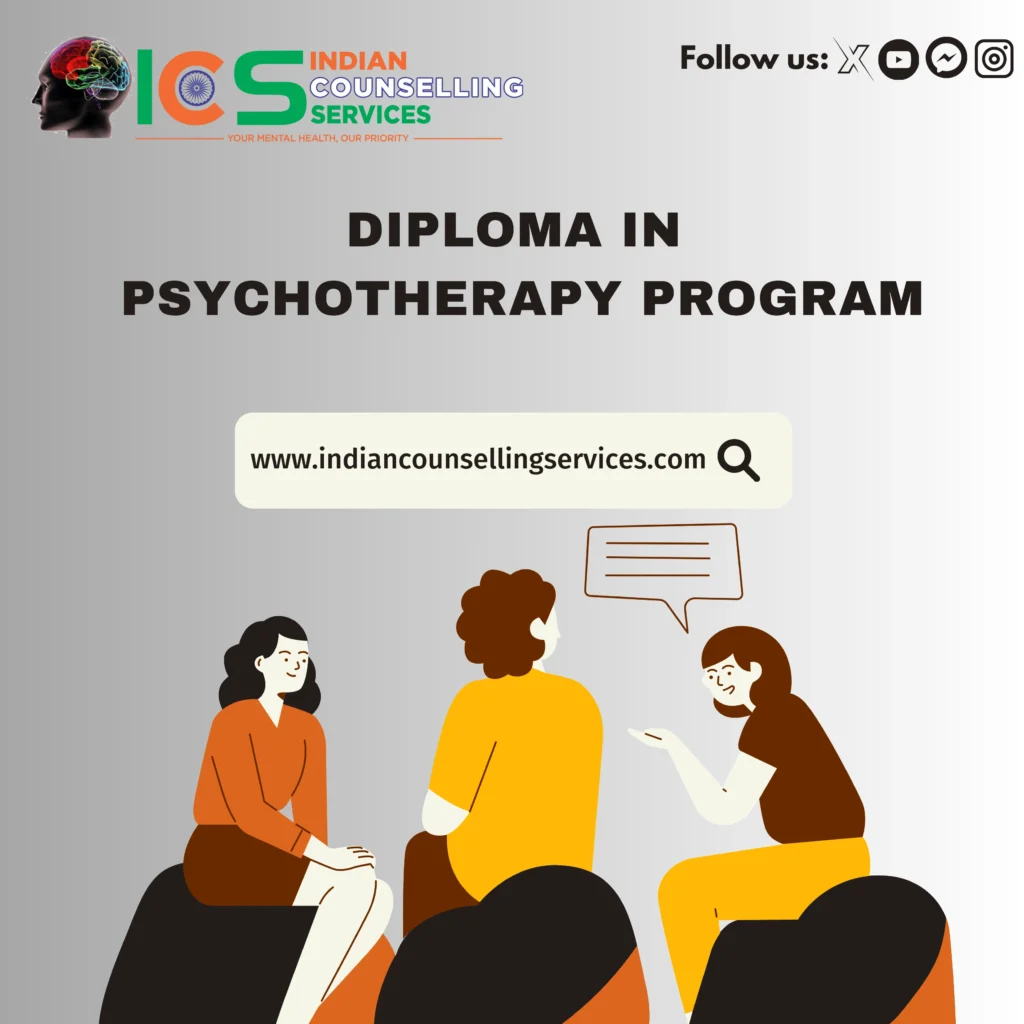
What to Expect from a Diploma in Psychotherapy Program
Enrolling in a Diploma in Psychotherapy program can be a transformative step for individuals interested in understanding human behavior, helping others, or pursuing a career in mental health. As society becomes increasingly aware of mental health issues, the demand for qualified psychotherapists continues to rise. This blog will guide you through the essential elements of a diploma program, including the curriculum, practical training, skill development, and potential career paths that may follow your studies.
The curriculum for a Diploma in Psychotherapy Program typically encompasses a wide range of subjects designed to provide a solid foundation in psychological principles and therapeutic techniques. Here’s what you can anticipate: a Core Psychological Theories
You will be introduced to fundamental psychological concepts, including:
- Cognitive Behavioral Therapy (CBT): An exploration of how thoughts shape emotions and behaviors.
- Humanistic Approaches: Focusing on personal growth, self-awareness, and the client-therapist relationship.
- Psychoanalytic Theory: Investigating the impact of unconscious thoughts and childhood experiences on behavior.
- Integrative Approaches: Learning how to blend various B therapeutic techniques for a holistic client approach.
- Therapeutic Techniques
A significant part of your education will involve hands-on training in various therapeutic methods, such as:
- Active Listening Skills: Developing the ability to truly hear and understand clients’ concerns.
- Building Empathy and Rapport: Learning techniques to create a safe, trusting environment for clients.
- Crisis Management Strategies: Gaining skills for handling high-stress situations and emergencies, Psychotherapy Program.
- Mindfulness Practices: Exploring methods to help clients manage anxiety and stress through mindfulness and relaxation techniques.
- Ethical Considerations
An essential focus of the program will be on ethics in psychotherapy, which will include:
- Confidentiality: Emphasizing the importance of protecting client information and privacy.
- Professional Boundaries: Understanding the dynamics of client-therapist relationships and maintaining professionalism, Psychotherapy Program.
Cultural Sensitivity: Recognizing the importance of cultural competence in therapy and how it affects client interactions.

A Diploma Psychotherapy Program is not only about theoretical knowledge; it also emphasizes the importance of practical experience. Here’s what you can expect in terms of hands-on training:
- Clinical Placements
Most programs will require you to complete a clinical placement or internship where you can apply what you’ve learned in real-world scenarios. Key aspects include:
- Direct Experience: Engaging with clients under the supervision of licensed professionals allows you to practice your skills.
- Variety of Settings: Placements may take place in various environments, such as hospitals, schools, or community health organizations, giving you a broad perspective on different populations.
- Supervised Practice: You will receive guidance and feedback from experienced therapists, helping you refine your approach and techniques.
- Role-Playing Exercises
Many programs incorporate role-playing and simulation to prepare students for actual client interactions. Benefits include:
- Safe Environment: Practice therapeutic techniques without the pressure of real clients, allowing for trial and error.
- Immediate Feedback: Instructors can provide constructive criticism to enhance your skills.
- Peer Learning: Engaging in role-playing with classmates fosters a collaborative learning atmosphere.
A key focus of your diploma program will be developing essential skills needed for effective practice. Here’s what you can expect to work on:
- Communication Skills
- Effective communication is vital in psychotherapy. You will learn to:
- Express Ideas Clearly: Convey complex concepts in an understandable manner for clients.
- Utilize Open-Ended Questions: Encourage deeper exploration of thoughts and feelings.
- Recognize Non-Verbal Cues: Understand how body language and tone can impact client interactions.
- Critical Thinking and Problem Solving
As a future therapist, you will face complex scenarios that require analytical skills. You will learn to:
- Assess Client Issues: Identify underlying challenges and patterns in behavior.
- Develop Treatment Plans: Create tailored approaches that align with each client’s needs and goals.
- Monitor Progress: Evaluate the effectiveness of interventions and adjust treatment strategies accordingly.
- Self-Reflection and Awareness
Becoming a therapist involves significant self-awareness. You will engage in:
- Personal Reflection: Explore your biases and how they might influence your practice.
- Manage Emotional Responses: Recognize your feelings toward clients and learn to address them appropriately.
- Commitment to Lifelong Learning: Embrace continuous personal and professional growth beyond your diploma studies.
Throughout your program, you’ll have the chance to build connections with peers, instructors, and industry professionals:
- Relationship Building
Establishing a professional network is crucial for your future. Expect to:
- Attend Workshops and Conferences: Engage with experts and learn from their experiences.
- Join Professional Associations: Many programs encourage students to become members of local or national psychotherapy organizations.
- Collaborate with Classmates: Foster relationships with fellow students, which can lead to mentoring and referral opportunities in the future.
- Supportive Community
The field of psychotherapy can be emotionally demanding. A good program will foster a supportive environment where you can:
- Share Experiences: Discuss your challenges and victories with peers who understand your journey.
- Access Resources: Take advantage of counseling services, stress management workshops, and other support mechanisms offered by the institution.
5. Career Paths After Graduation
Upon completing your Diploma in Psychotherapy, a variety of career opportunities may open up, including:
- Clinical Therapist
Many graduates choose to work as clinical therapists in different settings, such as:
- Private Practice: Establishing your own therapy practice to work with clients individually.
- Community Health Organizations: Offering services to underserved populations.
- Medical Facilities: Collaborating within hospitals or clinics to support patients’ mental health needs.
- Specialization Areas
You may also choose to focus on specialized fields, such as:
- Child and Adolescent Therapy: Addressing the mental health needs of younger clients.
- Trauma Counseling: Supporting individuals who have experienced trauma.
- Substance Use Disorder Counseling: Helping those struggling with addiction.
- Educational and Supervisory Roles
With further experience or qualifications, some graduates may move into teaching or supervisory positions in academic or community settings.
Conclusion
Embarking on a Diploma in Psychotherapy program is a significant step toward a fulfilling career in mental health. From a robust curriculum to hands-on training and networking opportunities, you can expect a comprehensive educational experience. This journey not only deepens your understanding of human behavior but also encourages personal growth and development. Whether your goal is to impact individual lives positively or contribute to the broader field of mental health, a diploma in psychotherapy equips you with the tools and insights needed to succeed.
If you’re considering this rewarding path, explore various programs, connect with professionals in the field, and discover how a Diploma in Psychotherapy can shape your future.

2 Comments
Illuminating the Mind: The Interplay of Creativity and Knowledge - indiancounsellingservices.in
October 26, 2024[…] The human mind is a fascinating and intricate entity that often eludes straightforward explanations. Yet, within its complexities lies a powerful synergy between two dynamic forces: creativity and knowledge. We possess the remarkable ability to learn, remember, and manipulate information, while simultaneously having the capacity to imagine, innovate, and create. When these two elements intersect, they not only generate groundbreaking ideas and innovations but also lead to deeply fulfilling personal experiences. This confluence illuminates our minds and broadens our potential in diverse and meaningful ways.In this exploration, we will delve into the definitions of knowledge and creativity, their interrelated dynamics, and how their union can catalyze breakthroughs across various domains, from science and art to personal growth and everyday problem-solving. […]
A Comprehensive Guide to Psychology and Counselling Courses
October 26, 2024[…] range of psychological issues. Specializations within clinical psychology include child psychology, neuropsychology, and geropsychology.2. Counselling PsychologyCounselling psychologists assist individuals in navigating personal and […]